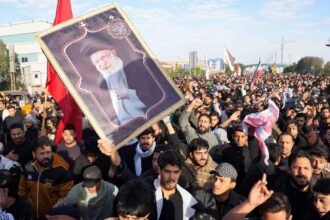India’s IITs have long been celebrated as the crown jewels of technical education, shaping some of the brightest minds of the nation. But in recent years, troubling questions are being raised: What happens when these prestigious campuses become breeding grounds for ideologically motivated propaganda? And why do some faculty members, under the guise of research and liberal education, repeatedly engage in activities that undermine India’s sovereignty, culture, and democratic institutions?
IIT Bombay in Controversy Again
The latest controversy erupted when IIT Bombay’s name surfaced as a co-sponsor of the “South Asian Capitalism” workshop hosted at UC Berkeley on September 12–13, 2025. The event’s poster prominently displayed images of Prime Minister Narendra Modi, Home Minister Amit Shah, and Uttar Pradesh CM Yogi Adityanath, with captions like: “We fool you. We shoot at you. We rule you.”
Even more striking was the selective targeting in the visuals: a Hindu monk draped in saffron robes was singled out as a symbol of “oppression,” raising uncomfortable questions about why only Hindu imagery was chosen for ridicule.
The workshop, advertised as an academic exploration of “how capitalist accumulation is socially structured across South Asia,” used language and graphics that went far beyond scholarly critique. Pyramidal graphics titled “Capitalist India,” slogans like “We fool you, we shoot at you,” and accusations against the Indian state and army turned the academic stage into a propaganda platform.
A deeper look at the workshop reveals the pattern. Despite being billed as a “South Asia” discussion, most themes targeted India. Topics ranged from “The Miyas of Colonial Assam” to “Ambedkar, Azad and Savarkar on Political Time after Empire.” Yet, glaringly absent was any meaningful focus on Pakistan, Bangladesh, or the persecution of minorities, particularly Hindus in those regions.
The imbalance raises a pertinent question: Why does “South Asia” become synonymous with criticizing India in Western academic and activist spaces?
The Ford Foundation–Soros Link
Scrutiny of IIT Bombay’s role revealed deeper institutional connections. The workshop was co-organized by the New Political Economy Initiative (NPEI) under IIT Bombay’s Centre for Liberal Education. NPEI is led by Anush Kapadia, a London-born academic and IIT Bombay faculty member.
Kapadia’s initiative has received ₹35 crore in funding from the Ford Foundation, an organization with known links to George Soros’ Open Society Foundation. Soros, a billionaire with a long record of interfering in sovereign democracies, has openly expressed his desire to engineer “regime change” in India. The channelling of Soros-linked funding into IIT Bombay through NPEI raises serious concerns about the foreign influence on Indian academia.
The Problematic Figures Behind It
Anush Kapadia has been a vocal participant in anti-CAA and NRC protests, having hosted a lecture titled “Who is the sovereign: The State or the People?” during the 2020 agitation. His track record shows a pattern of questioning India’s sovereignty under the guise of academic debate.
Kapadia has published only two research papers on IIT Bombay’s official portal, yet has hosted several politically charged events.
His Palestinian wife’s ideological leanings, combined with Kapadia’s invitation to known Hamas sympathizer Achin Vanaik in 2023 (eventually cancelled due to student protests), further underline the ideological slant.
Nayanta University has Meher Padamjee as one of its founding team members. To note here, Meher Padamjee is the daughter of Anu Aga, who was one of the members of Sonia Gandhi’s National Advisory Council. Furthermore, the Aga family is reported to have funde IPSMF, which funds portals like The Caravan, Article 14, and even Alt News, creating a media-academia nexus where the same ideological narratives are amplified across platforms.
Questionable Research Standards
Several papers produced under NPEI and associated scholars reveal shockingly low academic rigor:
- Qudsiya Contractor, a collaborator, has cited Wikipedia in her so-called research.
- Her articles in The Wire and Scroll promote narratives around beef, caste, and communalism, often without credible sourcing.
- Another faculty member, Prabhir Vishnu Poruthiyil, has relied on IndiaSpend (accused of selective reporting) to push the lynching narrative. He has even described the Modi government as “fascist” and compared Hindutva imagination to Nazis and ISIS.
Such patterns raise doubts: Are these individuals genuinely contributing to academic inquiry, or are they leveraging IIT’s prestige to push ideological propaganda funded by foreign networks?
The controversy deepens with reports that several IIT Bombay professors are mentoring the Maharashtra CM Fellowship Program. Critics argue that figures like Prabhir Vishnu Poruthiyil, with their openly biased views, should not be shaping governance-related initiatives.
Similarly, the Ashank Desai Centre for Policy Studies (ADCPS) at IIT Bombay has hosted figures like Yamini Aiyar (Centre for Policy Research, known for its ideological bias). One of its staff members, Shinjinee Majumdar, is linked to Alt News, an organization co-founded by Mohammad Zubair, accused of spreading fake news.
The Core Question
When premier Indian institutions like IIT Bombay allow ideologically motivated scholars, often backed by foreign funding, to shape academic and public discourse, it raises fundamental questions:
- Who is vetting these faculty appointments?
- Why are individuals with poor research track records but strong ideological leanings being given positions of influence?
- How much of Indian academia is being subverted by foreign-funded networks aiming to weaken national sovereignty?
Conclusion
The controversy around IIT Bombay’s association with the Berkeley event is not an isolated incident. It is a symptom of a deeper malaise, where a handful of politically motivated faculty members, backed by foreign foundations and Western academic networks, are using India’s premier institutions as staging grounds for propaganda.
India’s youth look up to IITs as temples of innovation and excellence. But if these temples are hijacked by activists masquerading as academics, the future of Indian higher education and indeed the future of India’s sovereignty stands endangered.







